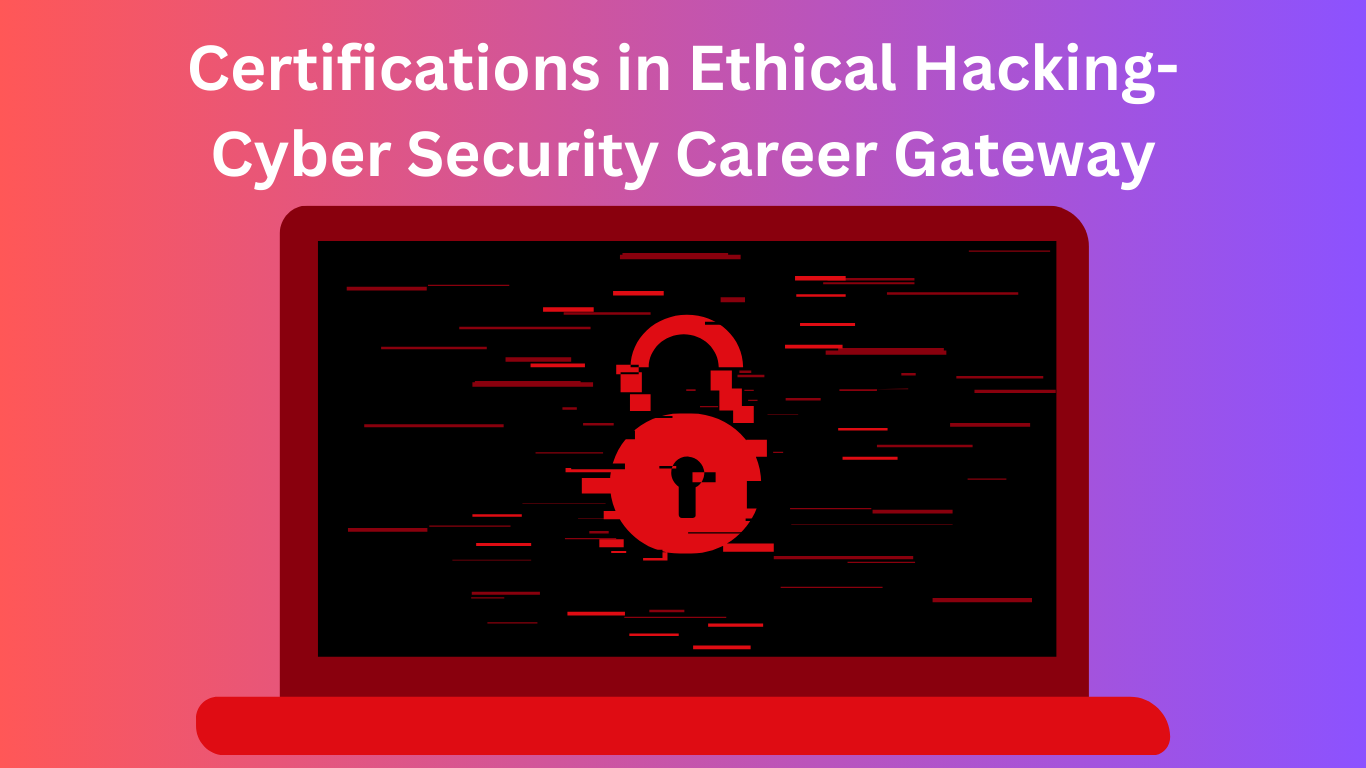Today, the threat of threats in cyberspace is at an all-time high, and with technological evolutions in sight with lightning speed. Organizations demand cybersecurity skills within all the diverse industries, be it big corporate firms or small-scale businesses, for a need for competent professional savvy in countering those malicious elements that pose threats to digital assets in this current world. Ethical hacking, in most respects, is the proactive side of cybersecurity—one of the most essential areas of expertise. Hence, as the demand for such ethical hackers grows, so too is the way to exciting lucrative careers in cybersecurity by garnering certifications in this area of ethical hacking.
What is Ethical Hacking?
Ethical hacking is one name given to authorized attempts at exploiting weaknesses in computer systems, networks, and applications. The basic objective of this kind of hacking is to seek the weakness before malicious hackers manage a chance to exploit the system. When illegal black-hat hacking is confined to illegal bounds, ethical hackers, also known as white-hat hackers, operate within legal as well as ethical bounds to strengthen cybersecurity.
Ethical hacking comprises various domains, including penetration testing, network security, web application security, and social engineering. Ethical hacking differs in method from malicious hacking but is carried out with permission and for a great cause: securing the organization’s digital infrastructure.
Growing Requirements for Ethical Hackers
Rapid advancement of cyberattacks in a growing trend as well as the increased probability of such attacks can be seen dramatically outlining an increasingly urgent need for experienced ethical hackers. Hackers keep getting smarter, and it is pressure time to try to keep up with this shifting landscape. Organizations like Cybersecurity Ventures now point out that by the year 2025, we will have a global shortfall of 3.5 million open positions in the cybersecurity workforce. This shortfall of skilled cybersecurity professionals creates great opportunities for such ethical hackers possessing the right amount of skills and proper certifications.
As ransomware attacks, data breaches, and the general rise in cybercrime open awareness on cybersecurity, government agencies, private companies, and financial institutions will scramble to have the services of an ethical hacker as part of their critical lines of defense. Thus, this trend makes ethical hacking a very attractive path for someone interested in technology, solving problems, and ensuring security.
Why Ethical Hacking Certifications Matter
While knowledge on programming, networking, and security-related topics is as vital for ethical hackers, certifications are now considered a fundamental step in the recruitment process for any cybersecurity professional. Cybersecurity certifications, most importantly, not only ensure that the applicant has demonstrated adequate knowledge but also give the hiring manager the luxury of choosing an expert who can make a difference from day one.
There are numerous benefits connected with certification to any individual who intends to join the profession of ethical hacking: PROVEN EXPERTISE
This certification will validate a particular individual’s dominance in ethical hacking. It confirms that an individual has the skill and information to perform penetration testing, vulnerability assessments, and other activities related to security. A registered certification improves the legality of a candidate and increases the likelihood of getting employed by known organizations.
1. More Job Opportunities
In such a highly competitive job market, certifications in ethical hacking make them distinguishable from those who do not have such. It is appreciable to the employers because it shows the level of commitment they have towards the profession and a deep understanding of the security protocols. Organizations often seek out people with certifications so as to fill up the cybersecurity roles, and well-certified candidates mostly get themselves to high-paying positions.
Cybersecurity is an always-evolving field of study. As technology broadens and advances, so do new threats; part of what it means to be an ethical hacker is continuing to update one’s knowledge of new tools and techniques. Most certifications necessitate some level of continued education, meaning applicants are guaranteed to stay up to date with the most current research done in the field. Such continuous learning can guarantee them retaining that ability and flexibility among ethical hackers.
2. Higher Paying Up Better leeway
Professional Services: Almost all of the hacking ethical certifications result in higher-paid jobs. A study carried out by the International Information System Security Certification Consortium, which publishes data known as (ISC)2, reveals that individuals holding cyber security certification tend to have average salaries that are 20% higher than those of their non-certified colleagues. Spending in a few certifications, therefore, will expand the earning capacities of the ethical hackers. The experiences may even break some career development boundaries.
Popular Ethical Hacking Certifications
There are several certifications for aspiring ethical hackers, and each of them emphasizes unique aspects in the area of cybersecurity. To give an overview, here are a few of the best-known and most respected certifications within the domain of ethical hacking:
1. Certified Ethical Hacker (CEH)
EC-Council offers the globally accepted ethical hacking certification, Certified Ethical Hacker (CEH). CEH is one of the well-recognized certifications and covers several domains pertaining to penetration testing, vulnerability assessment, cryptography, and network security. It is well-suited for professionals seeking a professional career as a practicing hacker or penetration tester. The CEH certificate is accepted worldwide by many organizations, and in most cases, prior to taking up various job positions in cyber security.
2. OSCP (Offensive Security Certified Professional)
OSCP is a hands-on, practical examination based on penetration testing, which tests the candidate’s capability to perform penetration testing in real-world settings. One of the most respected certifications in the cyber world, OSCP is administered by Offensive Security, which tests a candidate’s capability on exploiting vulnerabilities and unauthorized access of systems with demonstrations of skills in simulated environments. The OSCP is placed highly by employers and is definitely quite a nice challenge for anyone who wants to prove their penetration testing capabilities.
3. CompTIA Security:
CompTIA Security+ is a baseline certification for anyone who wants to venture into a cybersecurity career; they are noobs, and it is basically a foundation of security concepts, including network security, threats and vulnerabilities, and risk management. Its utility in professional life starts from the field of cybersecurity before specializing further in ethical hacking.
4. Certified Information Systems Security Professional (CISSP)
Certified Information Systems Security Professional is advanced by ISC². This puts information security in the right expertise mindset. The CISSP is not exactly an ethical hacking professional; however, for promotion purposes in positions related to management of cybersecurity, the CISSP is considered the ultimate career. Professionals on the CISSP side would always be expected to encompass more advanced knowledge in security architecture, risk management, and how incidents are responded to. All these fall under elements of ethical hacking.
5. Certified Penetration Testing Engineer (CPTE)
The Certified Penetration Testing Engineer is a specialized certification by the EC-Council offered to penetration testers exclusively. This really deals with advanced methodologies and techniques that approach both networks and applications with penetration testing. It’s a great addition to the portfolio of the professional looking forward to getting detailed knowledge in offensive security.
6. GIAC Penetration Tester (GPEN)
The GIAC Penetration Tester certification, or GPEN, offered by Global Information Assurance Certification to those whose profession pertains to vulnerability scanning and penetration testing validates knowledge regarding identification, exploitation, and risk mitigation.
It can be said that this certificate is very much a coveted qualification for any self-respecting ethical hacker.
The world has a gigantic demand for skilled professionals, and cyber attacks make ethical hacking one of the budding areas in cybersecurity; thus, ethical hacking certifications happen to be the most valuable one to date. It is not just about getting the skills but clearly communicating to the employer that the individual possesses the capability to identify and mitigate security risks.
Conclusion:
These certifications include such diverse names as CEH, OSCP, and CompTIA Security+, through which aspiring ethical hackers can build their knowledge and experience to keep up with the challenge of this challenging world. This is not entirely about technical know-how, as it still requires a mind made to solve problems, critical thinking, and understanding the cybersecurity arena to its core. This will open an enormous scope of career opportunities from which people can tender and try to contribute to the ongoing struggle against cybercrime.
Ethical hacking certification is going to be in demand with organizations emphasizing security and certifying professionals in preparation for their future successful and fulfilling careers in cybersecurity.


